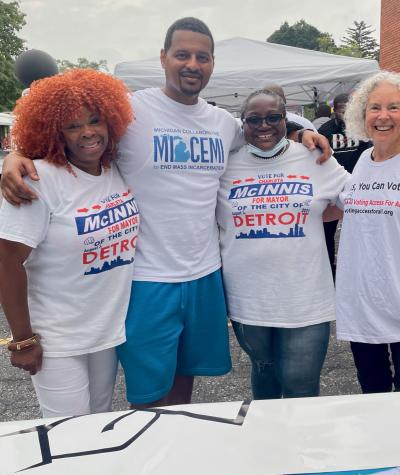This op-ed originally ran in The Detroit News, a newspaper covering breaking news and analysis in Detroit and the state of Michigan more generally.
My name is Danny Jones. I am a Detroit-native, currently serving as chairman of the volunteer-organized Voting Access for All Coalition and an Outreach Coordinator for the Michigan Collaborative to End Mass Incarceration. Right now, I am organizing with my community to ask our state’s independent redistricting commission to end the unjust and racist practice of “prison gerrymandering.”
I first learned about prison gerrymandering in the year 2000, when I was incarcerated at the Michigan Reformatory in Ionia, MI, which is located over 130 miles away from my hometown of Detroit. While I was there, an officer passed out census forms to everyone in the cell block. As I started filling out the form in my cell, I vividly remember hearing someone yell, “Don’t fill it out! They’re trying to count us as residents here in Ionia to receive more benefits and privileges.”
As soon as I heard that, I tore up the census form and threw it into the toilet. But this solution was temporary and imperfect. I wanted to be counted, just as part of my community, not in the community where I was being held.
This is the harm of prison gerrymandering. It distorts democracy by counting incarcerated people as residents of the places where prisons are located rather than in the communities where they come from. Under this system, incarcerated people end up being “represented” by elected officials who they cannot vote for and who have no connection to their family, friends, neighborhoods, or political communities.
Prison gerrymandering disproportionately harms communities of color and the Black community in particular in Michigan, in part because there are significant racial disparities in our prisons. Black people make up 46% percent of Michigan’s incarcerated population, even though they comprise only 14% percent of the total state population. Also, prisons are usually located in white-rural areas, while people who are incarcerated are disproportionately people of color who come from urban areas. For example, Ionia, where I was incarcerated, is 92% white. Of the approximately 5,000 non-white people who were counted as residents of Ionia in 2019, just over 50% were incarcerated in one of the four prisons there. Nearly a third of Michigan’s incarcerated population comes from Wayne County—where Detroit is located—but only 0.2% of the prison population is held and counted there.
Because of prison gerrymandering, our communities are not only robbed of fair representation, but also of access to resources that we could benefit from. Population numbers are used to allocate funding for things that directly impact the quality of life in a community and support things like hospitals, fire departments, schools, roads, and resources for job seekers. Communities like mine—that have been directly impacted by mass incarceration—need these resources to interrupt the cycles of poverty and violence that we struggle with. I became a proud first-time homeowner this year, but my neighborhood is a shadow of its former self. Before I went to prison, this was a beautiful, thriving community. Now, there are only five families that live on my block, and several vacant homes and empty lots. There’s a lot of crime and lot of violence. The resources we need to thrive just aren’t here. That’s the destructive impact of prison gerrymandering.
We cannot allow these harms to continue for another decade. The Michigan Independent Citizens Redistricting Commission is beginning the process of redrawing the state’s congressional and state legislative maps, and it has the power to abolish prison gerrymandering in Michigan now. The Commission has a constitutional mandate to ensure that districts “reflect the state's diverse population and communities of interest,” including by keeping together groups of people “that share cultural or historical characteristics or economic interests.” With this mandate, the Commission can draw fair maps to ensure that we are heard and have access to resources that improve the quality of life in our communities.
Now is the time for action. The U.S. Census Bureau released redistricting data to the states on August 12, and the Commission is already hard at work creating draft maps for release in mid-September. Final maps will be adopted on November 1, 2021. Our community will continue to do everything we can to raise the alarm about the injustice of prison gerrymandering between now and then. We hope the Commission will take steps to give us the fair representation we deserve.
Learn more about the Michigan Collaborative to End Mass Incarceration at MichiganCollaborative.org and the Voting Access for All Coalition at VotingAccessForAll.org.
